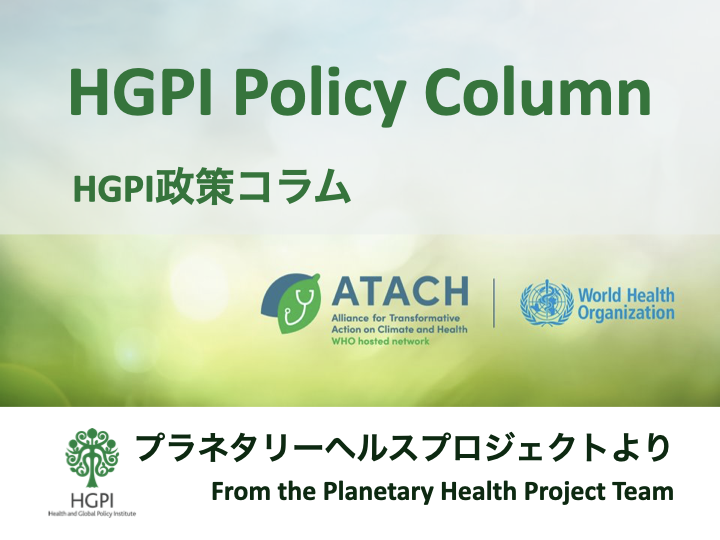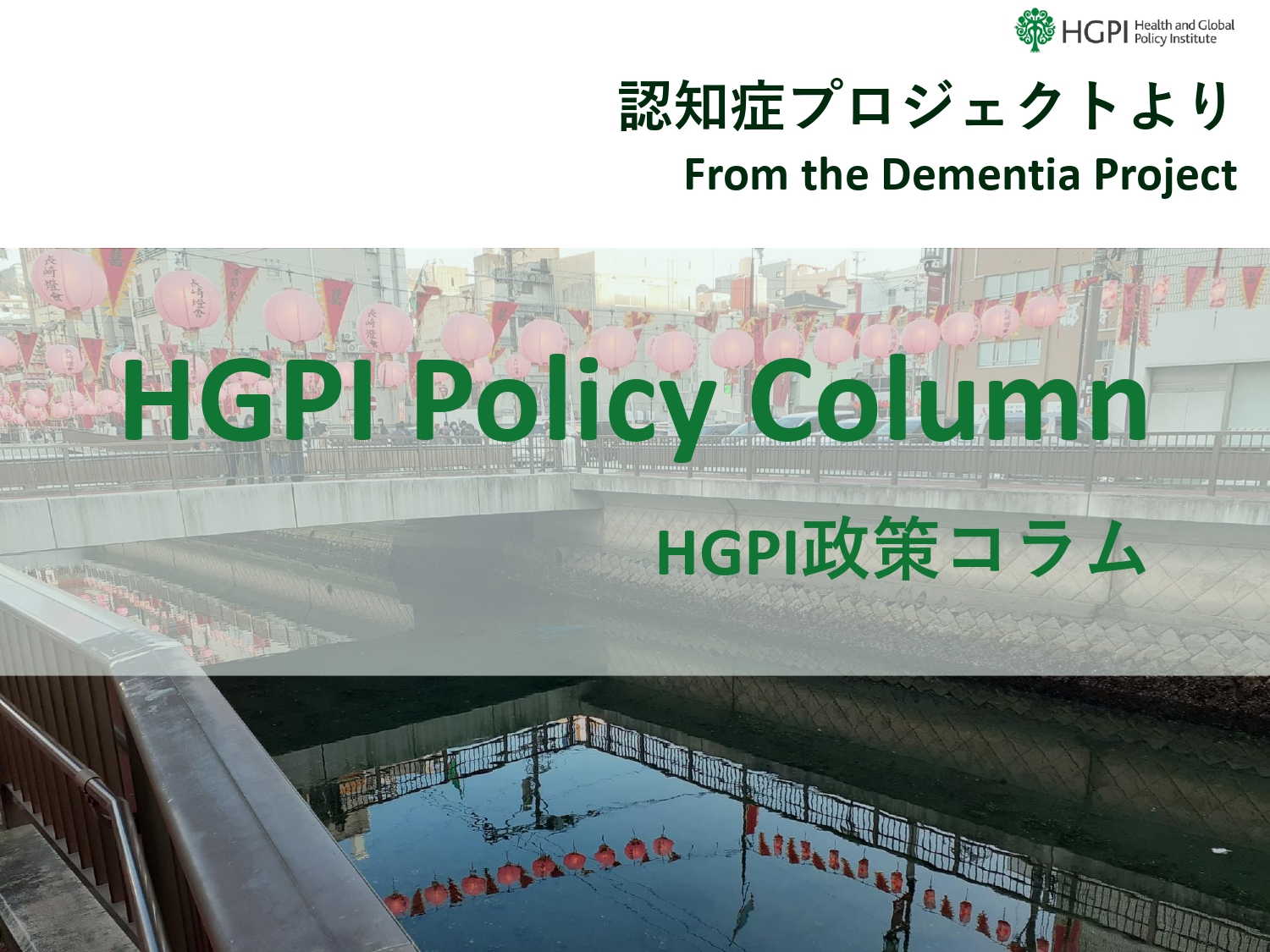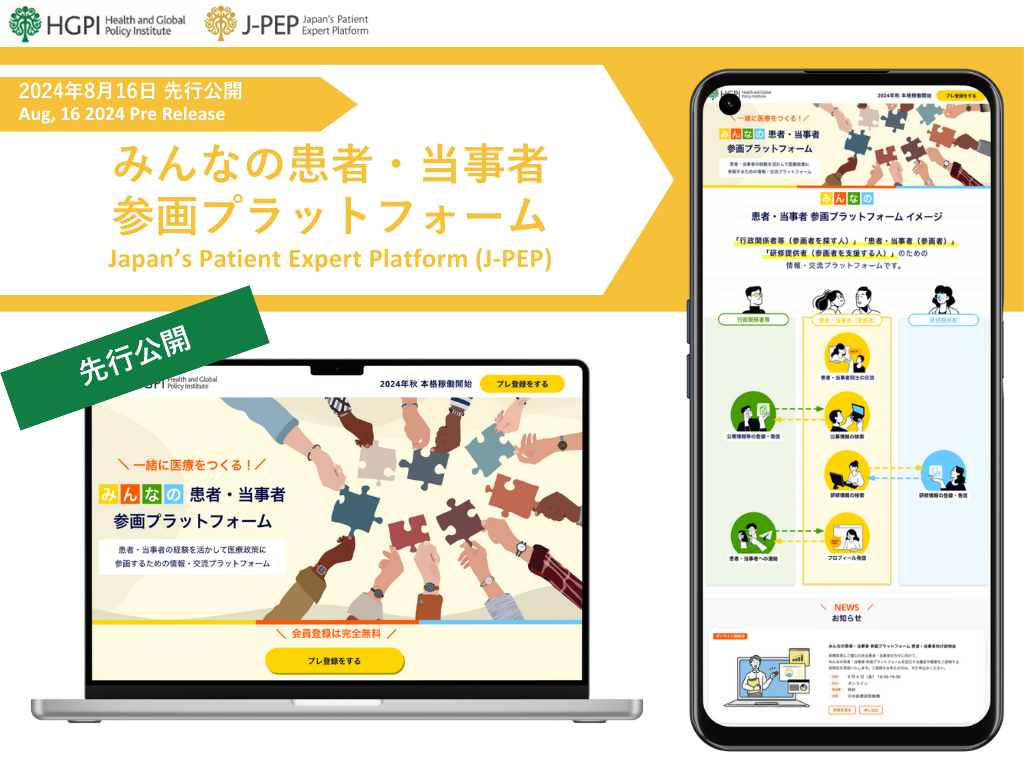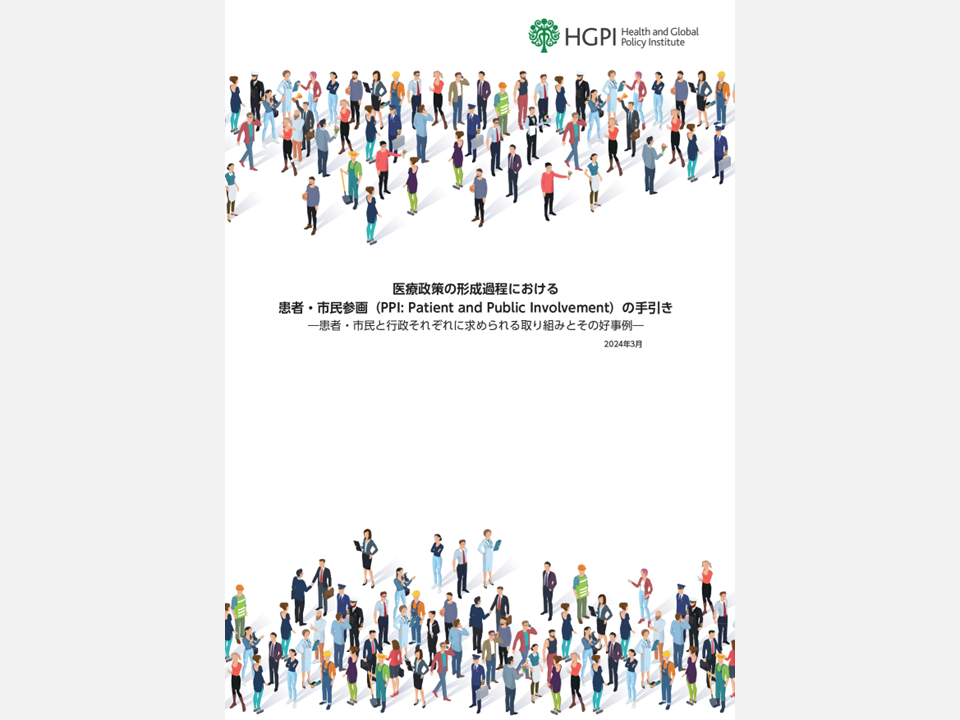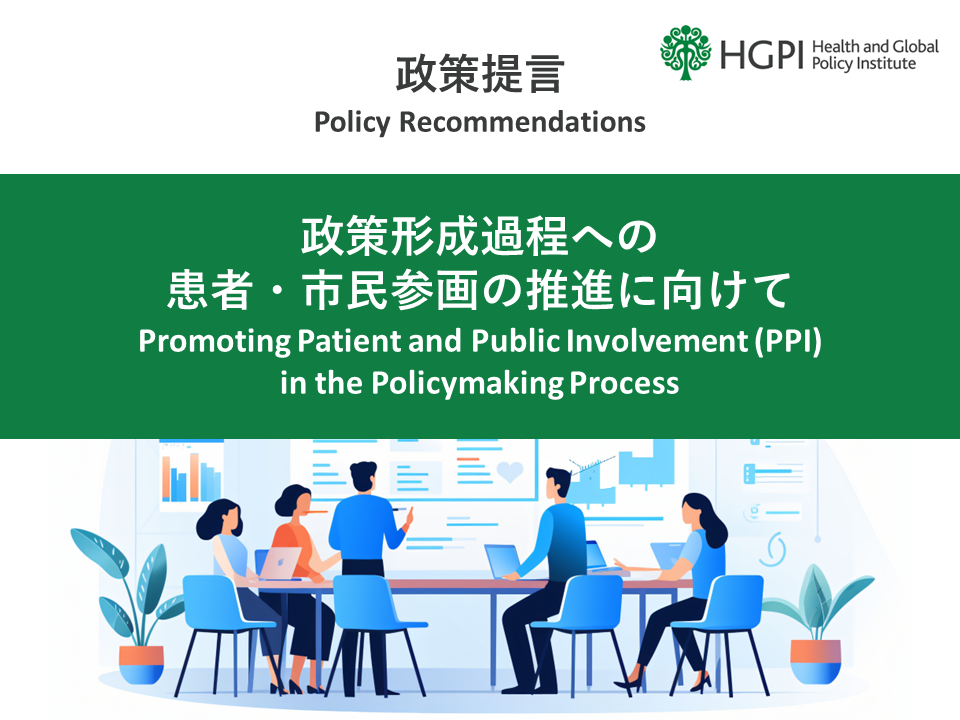[HGPI Policy Column] (No. 48) From the Meaningful Involvement Promotion Project: The Resolution on Social Participation at the 77th World Health Assembly
date : 9/27/2024
Tags: HGPI Policy Column, Meaningful Involvement Promotion, NCDs
![[HGPI Policy Column] (No. 48) From the Meaningful Involvement Promotion Project: The Resolution on Social Participation at the 77th World Health Assembly](https://hgpi.org/en/wp-content/uploads/sites/2/HGPI_20240924_PPI_HGPI-Policy-Column.jpg)
<POINTS>
- In May 2024, a resolution on social participation was endorsed at the 77th World Health Assembly (WHA77). It called upon World Health Organization (WHO) Member States to strengthen the capacities of government agencies and civil society to implement social participation.
- The WHO defines “social participation” as “empowering people, communities, and civil society through inclusive participation in decision-making processes that affect health across the policy cycle and at all levels of the system.”
- Social participation will be vital for achieving universal health coverage (UHC) and strengthening primary health care (PHC).
Introduction
Resolution WHA77.2 “Social participation for universal health coverage, health and well-being” was endorsed by the 77th World Health Assembly in May 2024. According to the World Health Organization (WHO), “social participation” is defined as, “Empowering* people, communities, and civil society through inclusive participation in decision-making processes that affect health across the policy cycle and at all levels of the system.” As this resolution is likely to result in social participation becoming an increasingly important factor in the health policy formulation process, this column will examine the history of events that led to the resolution as well as its content.
*The term “empowerment” as it is used here refers to “the process by which people gain control over the factors and decisions that shape their lives.”
Past developments in discussions on social participation
The endorsement of “Social participation for universal health coverage, health and well-being” can be traced to a number of earlier international initiatives that date back to the 1978 Declaration of Alma-Ata. While the Declaration of Alma-Ata is known for its proclamation of health as a fundamental human right, it also stated that social participation in the policy-making process is another such right. Article 4 of the Declaration states, “The people have the right and duty to participate individually and collectively in the planning and implementation of their health care.”
Since then, the importance of social participation has been the subject of ongoing discussion. For example, the 2011 Rio Political Declaration on Social Determinants of Health pledged to promote participation for communities and affected parties in policy-making processes that impact social determinants of health. Furthermore, Target 16.7 of the Sustainable Development Goals (SDGs) presented in 2015 reads, “Ensure responsive, inclusive, participatory and representative decision-making at all levels.” The promotion of social participation in global efforts to achieve universal health coverage (UHC) is also accelerating. The 2018 Declaration of Astana discusses strengthening Primary Health Care (PHC) systems to achieve UHC and identifies the acts of empowering and engaging communities in policy-making as essential aspects of strengthening PHC.
As discussions on the need for social participation in the context of achieving UHC and strengthening PHC continued to advance, during the WHA76 in May 2023, several Member States announced their intention to pursue a resolution on institutionalizing social participation at the WHA77 in 2024, and corresponding action indicators were compiled. In addition to reaffirming the need to accelerate action for UHC and the SDGs, the need for social participation was also highlighted at the UN High Level Meeting on UHC in September 2023. The corresponding Political Declaration also mentioned promoting social participation by “involving all relevant stakeholders, including local communities, health workers and care workers in the health sector, volunteers, civil society organizations and youth in the design, implementation and review of universal health coverage, to systematically inform decisions that affect public health, so that policies, programmes and plans better respond to individual and community health needs, while fostering trust in health systems.” This heightened momentum toward promoting social participation to achieve UHC and proposals from numerous WHO Member States led to the endorsement of the resolution on social participation by the WHA77.
Specific actions described in the WHA77 resolution
In the resolution on social participation, the WHA urged WHO Member States to “implement, strengthen, and sustain regular and meaningful social participation in health-related decisions across the systems, as appropriate, taking into account national context and priorities” through
(1) strengthening public sector capacities for the design and implementation of meaningful social participation;
(2) enabling equitable, diverse and inclusive participation with particular focus on promoting the voices of all those in vulnerable and/or marginalized situations;
(3) striving to ensure that social participation influences transparent decision-making for health across the policy cycle, at all levels of the system;
(4) implementing and sustaining regular and transparent social participation using a range of mechanisms supported by public policy and legislation;
(5) allocating adequate and sustainable public sector resources in support of effective social participation;
(6) facilitating capacity strengthening for civil society to enable diverse, equitable, transparent and inclusive social participation; and
(7) supporting related research, and piloting projects/programmes and their monitoring and evaluation to promote implementation of social participation
Furthermore, the resolution requested the Director-General
(1) to advocate for the regular and sustained implementation of meaningful social participation, both within the health sector as well as across other sectors and multilateral organizations that affect health equity and well-being, as a means to accelerate equitable progress towards universal health coverage, health security and the health-related Sustainable Development Goals;
(2) to develop technical guidance and operational tools for strengthening and sustaining social participation, including monitoring and evaluating implementation within countries, and provide training and technical support upon the request of Member States;
(3) to document, publish and disseminate Member States’ experiences in implementing meaningful social participation through different types of mechanisms, at different stages of the policy cycle, and at different levels of the system;
(4) to facilitate regular sharing and exchange of Member States’ experiences of social participation;
(5) to harmonize technical support on social participation across WHO divisions and the three levels of the Organization; and
(6) to report on progress in the implementation of this resolution to the Health Assembly in 2026, 2028 and 2030.
Between the 2021 WHO handbook on social participation for achieving UHC titled, “Voice, agency, empowerment – handbook on social participation for universal health coverage” and the WHA77 resolution on social participation, it is evident that progress is being made on establishing an international support system for promoting meaningful participation.
Implications for Japan
In Japan, there are a number of ongoing efforts to involve patients and affected parties such as family members, the bereaved, and other supporters in health and welfare policy-making processes. For example, in accordance with the Cancer Control Act, Cancer Control Promotion Councils are required to include members with lived or living experience with cancer. In addition, the Administrative Procedure Act obligates national administrative agencies to endeavor to gather opinions from the general public before issuing administrative orders or taking similar actions. As an increasing number of local governments enact ordinances related to involvement for citizens and community members, a legal foundation for promoting broad social participation is taking shape.
However, further efforts will be necessary to ensure there are opportunities for people with lived experience and—in a broader sense—citizens and community members throughout Japan to participate effectively in policy-making processes. After all, the number of people with lived experience and citizens who want to be involved does not necessarily increase in proportion to the need for their involvement. As a matter of fact, there have been cases in which local governments have tried to recruit people with lived experience to participate in meetings and failed to attract any applicants. There have also been cases in which those who did attend such meetings could not follow the discussions and thus could not contribute. In addition to ingenuity from administrative agencies, responding to these issues will require skill-building and other efforts targeting people with lived experience who participate.
“Social participation for universal health coverage, health and well-being” calls on WHO Member States to promote social participation through actions like strengthening the capacities of civil society and administrative agencies with the WHO Secretariat providing support in those efforts. Social participation is a vital element of achieving UHC. To enable Japan to promote social participation as well as to guide efforts to achieve UHC through social participation in its capacity as a global leader in UHC, we have high expectations for efforts to promote social participation through unified action involving administrative agencies and civil society throughout Japan.
Works referenced
- World Health Organization. Social participation for universal health coverage, health and well-being. World Health Organization: Geneva. 2024. https://apps.who.int/gb/ebwha/pdf_files/EB154/B154_CONF10-en.pdf. Accessed July 10, 2024
- World Health Organization. Health Promotion. World Health Organization: Geneva.
https://www.who.int/teams/health-promotion/enhanced-wellbeing/seventh-global-conference/community-empowerment. Accessed July 10, 2024 - World Health Organization. WHO called to return to the Declaration of Alma-Ata. World Health Organization: Geneva.
https://www.who.int/teams/social-determinants-of-health/declaration-of-alma-ata. Accessed July 10, 2024 - World Health Organization. Rio Political Declaration on Social Determinants of Health. World Health Organization: Geneva. 2011.
https://www.who.int/publications/m/item/rio-political-declaration-on-social-determinants-of-health. Accessed July 10, 2024 - United Nations. Goal 16 Promote peaceful and inclusive societies for sustainable development, provide access to justice for all and build effective, accountable and inclusive institutions at all levels. United Nations. Department of Economic and Social Affairs Sustainable Development.
https://sdgs.un.org/goals/goal16#overview. Accessed July 10, 2024 - World Health Organization. Declaration of Astana. World Health Organization: Geneva. 2018.
https://www.who.int/publications/i/item/WHO-HIS-SDS-2018.61. Accessed July 10, 2024 - The Civil Society Engagement Mechanism for UHC2030 (CSEM). Social Participation. 2023.
https://csemonline.net/social-participation/. Accessed July 10, 2024 - World Health Organization. Social participation for universal health coverage: technical paper. World Health Organization.
https://iris.who.int/handle/10665/375276. Accessed July 10, 2024 - World Health Organization. World leaders commit to redouble efforts towards universal health coverage by 2030. World Health Organization: New York, Geneva. 2023. https://www.who.int/news/item/21-09-2023-world-leaders-commit-to-redouble-efforts-towards-universal-health-coverage-by-2030. Accessed July 10, 2024
- 77th World Health Organization. World Health Assembly A77/A/CONF./3 Agenda item 11.1. World Health Organization: Geneva. 2024. https://apps.who.int/gb/ebwha/pdf_files/WHA77/A77_ACONF3-en.pdf. Accessed July 10, 2024
- World Health Organization. Voice, agency, empowerment – handbook on social participation for universal health coverage. World Health Organization: Geneva. 2021. https://www.who.int/publications/i/item/9789240027794. Accessed July 10, 2024
Authors
Yuri Isoda (Intern, HGPI)
Yui Kohno (Manager, HGPI)
Takahiro Sakauchi (Manager, HGPI)
Top Research & Recommendations Posts
- [Policy Recommendations] The Path to a Sustainable Healthcare System: Three Key Objectives for Public Deliberation (January 22, 2026)
- [Research Report] Perceptions, Knowledge, Actions and Perspectives of Healthcare Organizations in Japan in Relation to Climate Change and Health: A Cross-Sectional Study (November 13, 2025)
- [Research Report] The 2025 Public Opinion Survey on Healthcare in Japan (March 17, 2025)
- [Policy Recommendations] Reshaping Japan’s Immunization Policy for Life Course Coverage and Vaccine Equity: Challenges and Prospects for an Era of Prevention and Health Promotion (April 25, 2025)
- [Research Report] The 2023 Public Opinion Survey on Satisfaction in Healthcare in Japan and Healthcare Applications of Generative AI (January 11, 2024)
- [Research Report] AMR Policy Update #4: Cancer Care and AMR (Part 1)
- [Policy Recommendations] Developing a National Health and Climate Strategy for Japan (June 26, 2024)
- [Public Comment Submission] “Assessment Report on Climate Change Impacts in Japan (Draft Overview)” (December 24, 2025)
- [Research Report] Survey of Japanese Physicians Regarding Climate Change and Health (December 3, 2023)
- [Research Report] The Public Opinion Survey on Child-Rearing in Modern Japan (Final Report) (March 4, 2022)
Featured Posts
-
2026-01-09
[Registration Open] (Hybrid Format) Dementia Project FY2025 Initiative Concluding Symposium “The Future of Dementia Policy Surrounding Families and Others Who Care for People with Dementia” (March 9, 2026)
![[Registration Open] (Hybrid Format) Dementia Project FY2025 Initiative Concluding Symposium “The Future of Dementia Policy Surrounding Families and Others Who Care for People with Dementia” (March 9, 2026)](https://hgpi.org/en/wp-content/uploads/sites/2/dementia-20260309-top.png)
-
2026-02-05
[Registration Open] (Webinar) The 141st HGPI Seminar “Current Status and Future Prospects of Korea’s Obesity Policy: Voices of People with Lived Experience in Policy Promotion” (March 3, 2026)
![[Registration Open] (Webinar) The 141st HGPI Seminar “Current Status and Future Prospects of Korea’s Obesity Policy: Voices of People with Lived Experience in Policy Promotion” (March 3, 2026)](https://hgpi.org/en/wp-content/uploads/sites/2/hs141-top-1.png)
-
2026-02-06
[Research Report] AMR Policy Update #5: Cancer Care and AMR (Part 2)
![[Research Report] AMR Policy Update #5: Cancer Care and AMR (Part 2)](https://hgpi.org/en/wp-content/uploads/sites/2/HGPI_20260204_AMR-Policy-Update-5.png)




